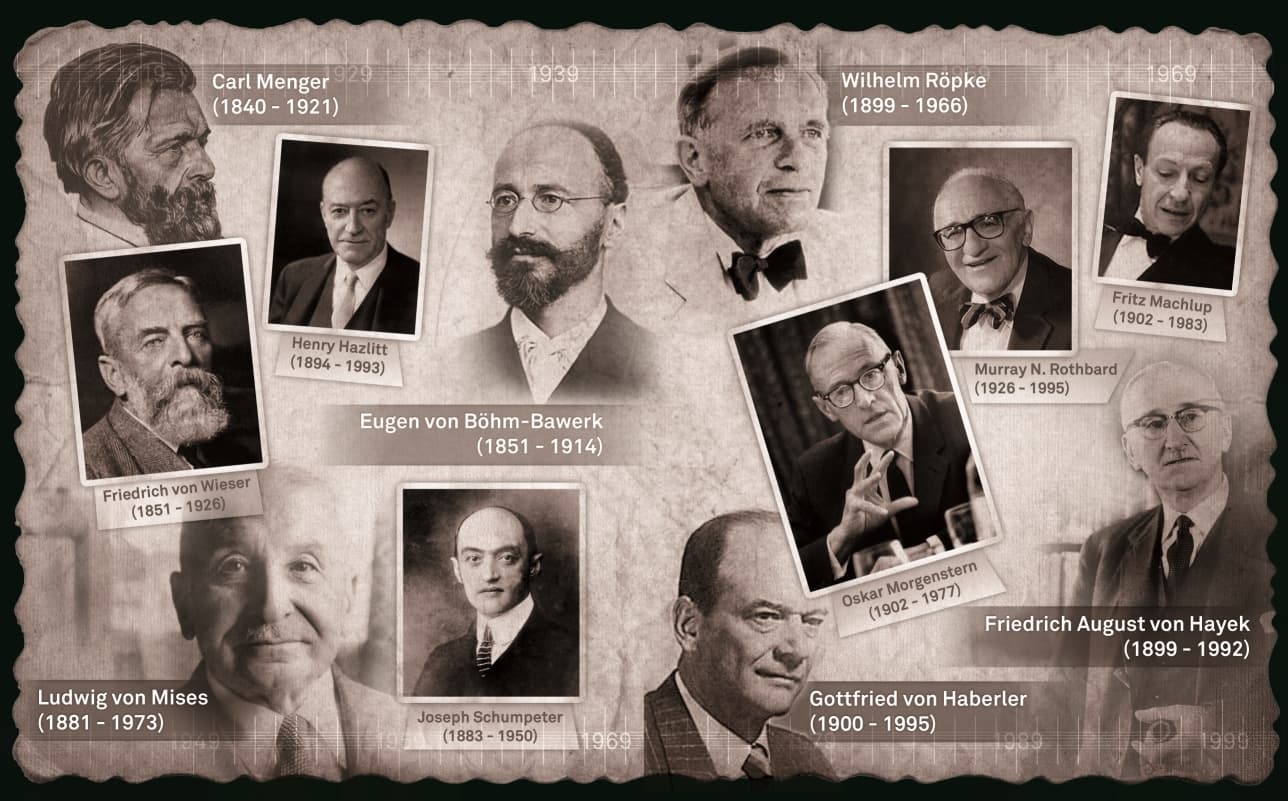The Austrian School of Economics is a well-known economic theory that originated in the late 19th century through the works of Carl Menger, Friedrich Hayek, Ludwig von Mises, and others. The school emphasizes the importance of subjective value, marginalism, and spontaneous order in understanding economic phenomena. Over the years, the Austrian School has significantly impacted many regions worldwide, particularly in the United States, Brazil, and Europe.

In the United States, the Austrian School has influenced economic policy and political discourse. The school’s advocacy for limited government intervention and free-market principles has gained traction among various political groups and think tanks, such as the Cato Institute and the Foundation for Economic Education. In Brazil, meanwhile, the ideas of the Austrian School have led to the emergence of a libertarian movement advocating for economic liberalization and individual property rights.

European countries have also experienced the influence of the Austrian School, particularly in its early development stages. The school’s principles have been critical in shaping the economic policies of several European nations during the 20th century. As leaders seek to navigate complex economic climates, understanding the history and real-life examples of the Austrian School’s impact can provide valuable insights and help foster informed decision-making.
Origins and Foundational Principles
Central Figures and Contributions
The Austrian School of Economics has its roots in late 19th-century Austria. Its most prominent figure is Carl Menger, who is considered the school’s founder due to his publication of Principles of Economics in 1871. The Austrian School’s primary focus is on the study of individual action and subjective decision-making, which led to the development of concepts such as marginal utility and methodological individualism.
Some key contributors to the Austrian School of Economics include:
- Carl Menger: Introduced marginal utility and laid the groundwork for methodological individualism.
- Eugen von Böhm-Bawerk: Known for his capital and interest theories and his opposition to Marxism.
- Ludwig von Mises: Advanced praxeology and contributed to monetary theory.
- Friedrich Hayek: Nobel laureate economist, known for his work in business cycles and monetary theory.
Methodology and Economic Thought
The Austrian School distinguishes itself with a unique approach to economics: praxeology and methodological individualism. Praxeology studies human action and decision-making, emphasizing that individual choices are the source of economic phenomena. It assumes that humans act purposefully, seeking to achieve desired ends with the available means.
Methodological individualism is the principle that social and economic phenomena can be best understood by analyzing the individual components that form them. This approach highlights the importance of individual preferences and motivations in shaping economic events.
One of the core tenets of the Austrian School of Economics is the theory of marginal utility. This theory posits that the worth of a product or service hinges on its utility, encompassing the satisfaction derived by the individual consumer. A pivotal revelation stemming from this framework is the inherent subjectivity of an item’s value, which can fluctuate significantly among individuals depending on their preferences and circumstances.
The Austrian School’s emphasis on individualism and subjectivity has significantly impacted economic thought and policy in the United States, Brazil, and Europe. Its teachings have been applied to real-world situations such as free-market capitalism, price formation, and the development of monetary policies.
In summary, the Austrian School of Economics has made substantial contributions to the field of economics through its central figures and unique methodologies. Leaders and policymakers can benefit from understanding its core principles and real-life applications to inform more effective decision-making in economic matters.
Historical Influence and Methodological Debates
Methodenstreit and the Historical School
The inception of the Austrian School of Economics took place during the latter part of the 19th century, emphasizing the significance of consumer utility in establishing the value of a product. This perspective stood in contrast to the Historical School, which was more focused on the evolution of economic phenomena in different historical contexts. One of the key debates between these two schools of thought was the Methodenstreit, a methodological dispute concerning the use of deductive reasoning versus empirical historical analysis.
The Austrian School, led by Carl Menger, advocated for deductive reasoning and the development of universal principles to explain economic phenomena. In contrast, the Historical School, led by Gustav Schmoller, argued for emphasizing empirical historical analysis and the importance of considering unique historical contexts in understanding economic systems. This debate significantly impacted the evolution of economic theory and resulted in the development of alternative approaches to understanding and explaining economic phenomena.
Comparisons with Neoclassical and Marxist Economics
The Austrian School of Economics can also be compared to Neoclassical and Marxist economics regarding methodology and underlying philosophical assumptions.
Austrian School vs. Neoclassical Economics
- Methodology: While the Austrian School emphasizes deduction and praxeology (the study of human action), Neoclassical economics relies more on mathematical models and empirical data to predict and understand economic behavior.
- Philosophy: The Austrian School emphasizes individual preferences, subjective values, and the importance of spontaneous order, while Neoclassical economics focuses on optimizing resource allocation to achieve equilibrium and efficiency.
Austrian School vs. Marxist Economics
- Methodology: The Austrian School’s deductive methodology contrasts with the dialectical materialism approach of Marxist economics, which examines the interaction between economic, social, and political forces.
- Philosophy: Austrian economists are more concerned with allowing freedom for individuals in the market, whereas Marxist economics emphasizes the state’s role in addressing class struggle and exploitation issues.
The Austrian School of Economics has engaged in several methodological and philosophical debates with other schools of thought. These debates have contributed to developing various economic perspectives and furthered the understanding of diverse factors influencing economic systems.
Theoretical Contributions to Political Economy
Entrepreneurship and Market Process
The economic philosophy known as the Austrian School, originating from Carl Menger’s 1871 work “Principles of Economics,” underscores the significance of entrepreneurship and the market process for comprehending the workings of the economy. Austrian economists argue that individual entrepreneurs, motivated by profit potential, create the market process through their decision-making, risk-taking, and innovation. Highlighting the pivotal role of the entrepreneur elucidates the mechanics of market functioning and the efficient allocation of resources.
An important concept in the Austrian School is economic calculation, which refers to the process by which entrepreneurs assess market information and make decisions about production and resource allocation. The Austrian economists argue that the price system is crucial in providing this necessary information and guiding entrepreneurs in their decision-making processes.
Critiques of Government Intervention
The Austrian School is known for its strong critiques of government intervention in the economy, arguing that such intervention distorts the market process and leads to inefficiencies. Austrian economists believe that the market is the best mechanism for allocating resources and adapting to consumer preferences when allowed to function freely.
One key criticism of the Austrian School is that it is directed towards socialism and central planning. Austrian economists contend that socialist systems cannot effectively calculate resource allocation due to the lack of a functioning price system. This results in economic inefficiencies and a failure to meet consumer needs.
In addition to critiquing socialism, the Austrian School has also been critical of government intervention in various forms, such as monetary and fiscal policies. Austrian economists favor using monetary instruments like interest rate adjustments and monetary supply control to address economic issues rather than direct government spending.
Austrian economists have influenced economic policy in regions such as the United States, Europe, and Brazil. Some real-life examples of Austrian economic principles being applied include:
- In the United States, Austrian economic thought partially influenced the rejection of Keynesian economics and the move towards more market-oriented policies during the Reagan era.
- In Europe, the process of privatization and liberalization in countries like the United Kingdom and Germany in the 1980s and 1990s was, in part, a reflection of Austrian principles.
- In Brazil, Yeda Crusius, who served as a state minister in the country in the early 2000s, is known to have been inspired by Austrian economic thought in her fiscal and economic policy approach.
Impact on Modern Economic Thought and Policies
Influence on Classical Liberalism and Laissez-Faire
The Austrian School of Economics has significantly impacted modern economic thought, particularly classical liberalism and laissez-faire policies. The school’s emphasis on individualism, minimal government intervention, and the importance of market-driven price mechanisms has shaped the foundations of classical liberalism as an economic philosophy.
Laissez-faire, which advocates for minimal government interference in markets, has been heavily influenced by the Austrian School. For instance, the economic calculation problem, introduced by Ludwig von Mises and Friedrich Hayek, argues that central planning is inefficient and that decentralized markets are better equipped to allocate resources. This core idea has strengthened the argument for laissez-faire policies and helped shape the modern economic landscape in various countries.
The Austrian School’s Role in Academic and Public Choice Economics
The Austrian School has contributed to the development of several economic theories and concepts in academia. Some key contributions include:
- Austrian Business Cycle Theory: This theory posits that government intervention, particularly in monetary policy, can lead to economic booms and busts, emphasizing the importance of sound money and fiscal prudence.
- Catallactics: This concept, introduced by Ludwig von Mises, focuses on understanding the processes of exchange and price formation in a market economy, underscoring the significance of individual actions in shaping market outcomes.
In addition to its influence on academic economics, the Austrian School has also played a crucial role in shaping public choice theory—a field of economics that studies the behavior of politicians and bureaucrats in relation to public policy decisions. Many Austrian School economists, such as James M. Buchanan and Gordon Tullock, have contributed to the development of public choice theory, particularly in the areas of government failure and the analysis of rent-seeking behavior.
Key Economists and Scholarly Contributions
Ludwig von Mises and Hayek’s Theories
Two of the most well-known Austrian economists are Ludwig von Mises and Friedrich Hayek. As pioneers in the Austrian School of Economics, they significantly contributed to economic theory and impacted policy-making in various countries.
Ludwig von Mises is considered an important figure in the Austrian School. His notable work Human Action, published in 1949, covers topics such as praxeology, the study of purposeful human action. Mises argues that human actions are driven by subjective values that cannot be measured objectively or quantitatively. He also contributed to monetary theory and business cycle theory, standing against the idea of central banks controlling the money supply. Mises influenced the development of libertarianism and anarcho-capitalism in various parts of the world, including the United States and Europe.
In 1974, Friedrich Hayek received the Nobel Prize in Economic Sciences, recognizing his pioneering advancements in monetary theory, business cycles, and astute examination of central planning. His book The Road to Serfdom highlights the dangers of central planning and socialism and advocates for a free-market economy. The ideas presented by Hayek have played a crucial role in shaping the perspectives of political figures, such as Margaret Thatcher in the UK and Ronald Reagan in the US.
Later Austrian Economists and Diverse Schools of Thought
Following the contributions of Mises and Hayek, other Austrian economists, such as Murray Rothbard and Israel Kirzner, have continued to expand upon the Austrian School of Economics, providing further insight and diversified approaches to its principles.
Murray Rothbard is credited with the development of anarcho-capitalism. He built on Mises’ work and advanced the ideas of libertarianism and free-market capitalism. Rothbard’s book Man, Economy, and State comprehensively analyzes the Austrian School’s economic theory and policy, criticizing the Keynesian and Chicago schools of economics. Rothbard’s work influenced the libertarian movement in the United States and contributed to the emergence of the Austro-libertarian school of thought.
Israel Kirzner is known for his work on the role of entrepreneurship in the market process. He introduced the concept of alertness as an essential factor in entrepreneurial success and profit. Kirzner argued that entrepreneurs serve as arbiters of market equilibrium, spotting opportunities and acting on them to close gaps between supply and demand. His work expanded the neoclassical understanding of the market process and underpinned the Austro-neo-classical school of thought.
Global Influence: The Austrian School in the US, Brazil, and Europe
Adoption and Adaptation in the United States
In the United States, the Austrian School of Economics gained recognition through the work of Ludwig von Mises and Friedrich von Hayek, who significantly impacted American economic thinking. During the mid-20th century, their ideas were adopted and adapted, emphasizing free-market capitalism and minimal government intervention. Notable institutions supporting Austrian economics in the US include the Mises Institute and the Cato Institute. The school’s influence is also evident in the policies and ideas of influential politicians such as Ron Paul and Rand Paul.
Economic Policies and Academic Reach in Brazil
In Brazil, the Austrian School has recently gained traction with the rise of libertarianism and free-market ideas. This movement has led to increased academic interest in Austrian economics, with universities like Fundaçāo Getúlio Vargas offering courses on the subject. Brazilian economists like Helio Beltrão and Leandro Roque have helped popularize the school of thought within the country. The Austrian perspective has also influenced the policies of Brazil’s Ministry of Economy, which is focused on reducing state intervention and fostering private sector growth.
Continental Europe’s Reactions and Contributions
The Austrian School of Economics originated in Europe, with its foundations laid by Carl Menger, Eugen von Böhm-Bawerk, and Friedrich von Wieser. Despite facing initial skepticism and resistance in Europe, the school has made considerable contributions to European economic thought.
- One of the most significant impacts has been on the Eurozone’s monetary policy. Hayek’s ideas about competitive currency systems have prompted debates on the effectiveness of the Euro as a single currency.
- The Austrian Business Cycle Theory, which attributes economic booms and busts to manipulations in the money supply, helped inform policy responses during the European Sovereign Debt Crisis.
- Their theories on entrepreneurship and decentralization have resonated with many European economists, leading to the development of modern business models and practices.
The Austrian School’s influence has been felt throughout Europe, with its ideas driving economic discourse and shaping policy decisions while attracting critiques and support from various quarters.
Practical Applications and Real-Life Examples
Theories in Action: Case Studies
United States: The Austrian School of Economics significantly impacted the US economic policy, particularly during the Reagan administration. The implementation of various tax cuts and deregulation policies can be traced back to Austrian economic thought, which prioritizes minimal government intervention and a strong focus on individual liberty. It is widely believed that these policies contributed to the economic growth observed in the US during the 1980s.
Brazil: In recent years, Brazil has also seen a resurgence of interest in the Austrian School of Economics. This was particularly evident during the 2018 presidential election, where two of the main candidates espoused Austrian economic ideas. These candidates advocated for free markets, deregulation, and a more dynamic allocation of resources in the Brazilian economy. Although no drastic changes have been made, it demonstrates the growing influence of Austrian economic thought in Brazil.
Europe: The Austrian School has had a varying degree of impact across Europe. For instance, Estonia, a small Baltic nation, implemented economic reforms inspired by the Austrian School following its independence from the Soviet Union in 1991. This included a flat tax system and an emphasis on deregulation, which helped the country achieve significant economic growth and attract foreign investment.
Current Implementations of Austrian Economic Policies
- Economic Calculation Problem: The Austrian School’s focus on the economic calculation problem has led to a better understanding of market analysis and allocation of resources. This insight has influenced modern businesses, particularly in the technology sector, as they strive to allocate resources efficiently and remain competitive.
- Austrian Business Cycle Theory: Policymakers and economists worldwide use the Austrian Business Cycle Theory to understand the cause of economic fluctuations. By recognizing the role of central banks and monetary policy in causing boom-bust cycles, this theory enables the adoption of stable economic policies that promote sustainable growth.
Leadership Insights: What Leaders Need to Know
Applying Austrian Economic Principles to Business Strategy
The Austrian Economic School underscores the significance of individual choice, enabling enterprises to customize their approach to align with their clientele’s distinctive requirements and inclinations. Companies can stimulate innovation, growth, and development within their industries by focusing on consumer choice. Acknowledging the importance of competitive dynamics empowers leaders to consistently enhance and perfect their offerings, ensuring superior service to their intended audiences.
For instance, a business leader operating in a competitive market should emphasize flexibility and adaptability, which are key elements in Austrian economic theoretical frameworks. Taking this approach can lead to more dynamic business models and quicker responses to changing market conditions.
Anticipating Market Changes and Economic Shifts
In addition to focusing on consumer choice and competition, Austrian economics provides insights into anticipating market changes and economic shifts. One of the main tenets of the Austrian School is the notion that economic systems are complex and intertwined. As a result, local or global economic changes can have ripple effects on various markets and industries.
As a leader, staying informed about macroeconomic trends and developments and understanding how they can impact your business directly or indirectly is essential. By doing so, you can proactively adjust your business strategy to accommodate these shifts and maintain a competitive edge in your industry.
For example, suppose leaders know that a potential economic downturn may affect raw material prices. In that case, they might secure alternative suppliers or adjust production methods to minimize the impact on their business. Following the Austrian School’s principles helps leaders adapt their strategies based on the anticipated market changes.
Future Prospects and Evolving Interpretations
Challenges and Opportunities in the 21st Century
The Austrian School of Economics, emphasizing individual utility and the subjective nature of value, has faced its share of challenges in the increasingly interconnected global economy. As markets and societies evolve, theoretical developments within the school must remain adaptable in the face of new economic realities. One such growth area is incorporating heterodox approaches and perspectives from other fields, such as ecological economics. This interdisciplinary focus can address pressing issues like sustainability, natural resource management, and the role of the environment in economic decisions.
In addition to these broader challenges, the Austrian School faces specific hurdles in its impact on various regions, including the United States, Brazil, and Europe. These regions, influenced by diverse economic and political systems, these regions present unique opportunities for applying Austrian principles. For instance, in the US, Austrian theories can contribute insights into the role of market competition, deregulation, and the effects of monetary policy. Meanwhile, in Brazil, policymakers could consider Austrian-inspired strategies to stimulate their economic development and address income inequality. Lastly, the European Union can learn from the Austrian School’s emphasis on subsidiarity, decentralization, and the importance of national identities in shaping economic policies.
Hybrid Approaches and Interdisciplinary Potential
Given the dynamic nature of today’s global economy, the Austrian School will benefit from open discussions and collaborations with alternative schools of thought. The school can explore new ways to strengthen its theoretical foundations and expand its practical applications through such exchanges. Some potential hybrid approaches include:
- Behavioral economics: marrying the Austrian School’s emphasis on individual utility with insights into human cognition and decision-making,
- Institutional economics: examining how institutions influence market processes and results, integrating insights from Austrian intellectuals such as von Hayek and von Mises,
- Evolutionary economics: examining how economic systems change over time in response to innovation and adaptation, drawing on Austrian concepts of entrepreneurship and market process.
By embracing interdisciplinary potential, the Austrian School can evolve and thrive in the modern era, offering valuable insights and guidance for policymakers and business leaders alike.
By embracing interdisciplinary potential, the Austrian School can evolve and thrive in the modern era, offering valuable insights and guidance for policymakers and business leaders alike.



